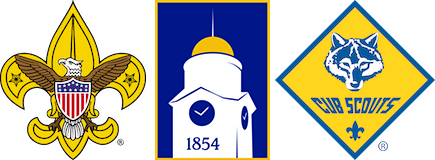Time committment
So, how much time does all this take, anyway? It varies a little from unit to unit, but generally:
-
Scouts BSA Troops have a Troop meeting one weeknight per week (e.g., every Wednesday, every Thursday, or so on). These meetings might be one hour to 90 minutes. Also, the Troop will generally go on one overnight activity (campout, trip, etc.) per month. Lastly, the Scout BSA Troops in West Hartford generally go a week of a BSA summer camp early in the summer, and then go on haitus until school starts again.
-
During normal years, Cub Scout Packs will have a similar (but lighter!) schedule: one or two week-night meetings per month, one or two day-trips per month, and one to three overnight trips per year. Most packs also go on hiatus during the summer, but may or may not go to a BSA summer camp (depending on the unit's preferences). During COVID years, however, Packs have needed to be more flexible. All Packs have needed to adapt to COVID restrictions on social distancing and indoor meetings, but different packs have adapted in different ways. One Pack has switched to monthly two-hour meetings at Westmoor Park (plus monthly outing), for example, while another has moved to outdoor campfire meetings during the week. For more details, please contact individual Packs.
(Not sure what we mean by 'Pack', 'Den', or 'Troop'? See How it works.)
Parental involvement
Parents are the lifeblood of Scouting units. Units are completely volunteer-run, and (with very few exceptions) those volunteers are parents. So if you have a child in a Scouting unit, you will be asked to contribute your time and expertise. Fortunately, there are a variety of ways to do so:
-
Scouting will teach the youth a variety of skills, from camping to citizenship and from animal science to woodworking. (See the current list of merit badges.) So if you have any relevant professional expertise or hobbies, units would love for you to share them through a presentation or class.
-
Units also always need 'uniformed' leaders for hands-on leadership of units. At the Cub Scout level, Packs need Cubmasters and Den Leaders. And while Scout BSA Troops aim to be youth-led, Scoutmasters and Assistant Scoutmasters are needed to help the youth plan activities and to ensure things run smoothly.
-
Lastly, units are adminstered by Committees who oversee the 'business' side of the unit: managing finances, keeping the paperwork up to date, and so on.
Dues and fundraising
Unfortunately, Scouting programs do take money to run, and that money must come from somewhere. Units generally finance themselves through a combination of dues and fundraising. Units set their own dues, but these are generally in the range of $150 to $200 per year (which, remember, is a 9-month program with about that number of outings or campouts). But having said that:
-
There are steep discounts available for disadvantaged youth who qualify for low-income programs (Husky health, free student lunches, etc.), and
-
Units often offer a discount on dues to youth who significantly contribute to fundraising activities.
On the other hand, the dues usually only cover day-to-day operations of the unit (a hefty chunk of which goes to insurance). Dues generally do not cover the costs of some activities (food for campouts, tickets to sporting events, etc.) or uniforms (though many units have used and outgrown uniforms they can pass on if requested).
Next steps
-
Ready to get started? Contact a local unit regarding a visit!
-
Want to see what we do? Check out our activities.
-
Want to know more? Read about how it works and safety.
-
Still have questions? Feel free to reach out.
